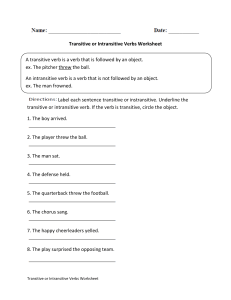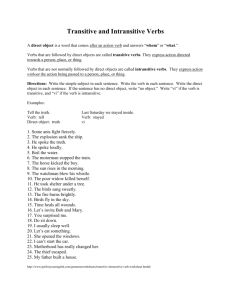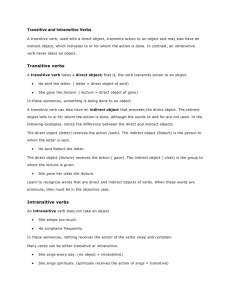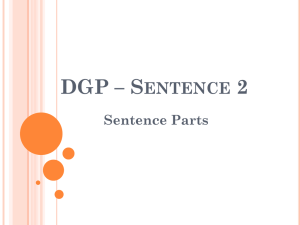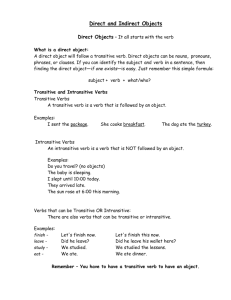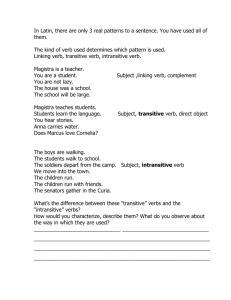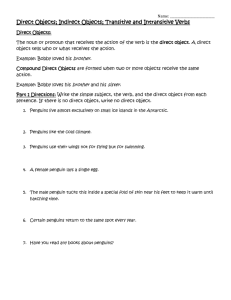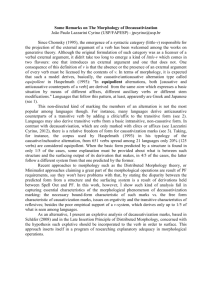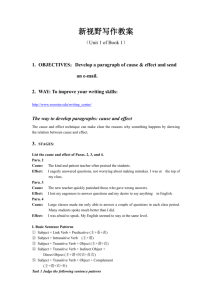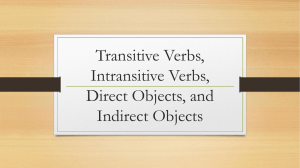January 7, 2013--Periods 1 & 3 Standard Agenda #1 Entry #1
advertisement
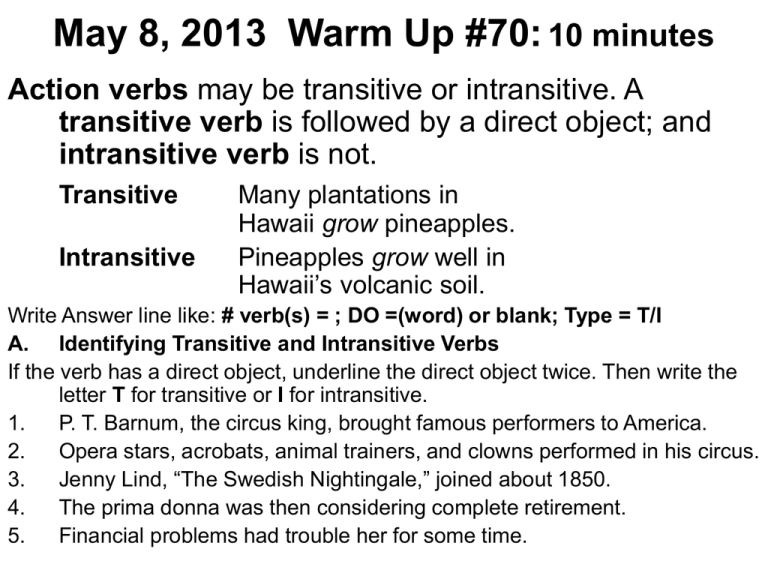
May 8, 2013 Warm Up #70: 10 minutes Action verbs may be transitive or intransitive. A transitive verb is followed by a direct object; and intransitive verb is not. Transitive Intransitive Many plantations in Hawaii grow pineapples. Pineapples grow well in Hawaii’s volcanic soil. Write Answer line like: # verb(s) = ; DO =(word) or blank; Type = T/I A. Identifying Transitive and Intransitive Verbs If the verb has a direct object, underline the direct object twice. Then write the letter T for transitive or I for intransitive. 1. P. T. Barnum, the circus king, brought famous performers to America. 2. Opera stars, acrobats, animal trainers, and clowns performed in his circus. 3. Jenny Lind, “The Swedish Nightingale,” joined about 1850. 4. The prima donna was then considering complete retirement. 5. Financial problems had trouble her for some time. The Answers ARE: 1. Verb = brought; DO = performers; Type = T 2. Verb = performed; DO = blank; Type = I 3. Verb = joined; DO = blank; Type = I 4. Verb = was considering; DO = retirement; Type = T 5. Verb = had troubled; DO = her; Type = T May 8, 2013, Periods 1 & 3 STANDARD: Reading Standard 3.3 Analyze interactions between main and subordinate characters in a literary text (e.g, internal and external conflicts, motivations, relationships, influences) and explain the way those interactions affect the plot. SWBAT: Openly discuss the reading and justify the answers. Agenda Grade 10 ELA Sample Assessment 3: Homework Review Answers: Read “Summer Rituals”. 12. 13. 14. 15. 16. 17. 18. 19. A C A A A D D A 20. 21. 22. 23. 24. 25. 26. D D B A C B C 27. SCR 28. C 29. A 30. B 31. A 32. B Copy/Draw form the Short Construction Response May 8, 2013, Periods 1 & 3 Agenda STANDARD: SpringBoard: Unit 3 Community Reading Standard 3.3 Analyze interactions between main and TFA: Chapter 5: subordinate characters in a literary text We will start reading Chapter 5 page 34 at (e.g., internal and external conflicts, “Who killed this tree?” at the top of the motivations, relationships, influences) page. Summarize today’s reading in a and explain the way those interactions paragraph. affect the plot. As we Read Complete as much as Reading Standard 3.11 possible: Evaluate the aesthetic qualities of style, including the impact of diction and • Activity 3.8 A Man of Prestige 157 & figurative language on tone, mood and 158 theme, using the terminology of literary • Activity 3.9 Okonkwo’s Family 159 & criticism (Aesthetic approach) 160 SWBAT: Let’s continue reading and discussing the story called “Sweet Write a summary of Chapter 5 today’s Potato Pie” by Eugenia Collier reading. Complete Activity 3.8 and Activity 3.9. 1. Summarize today’s reading. Language Objective: Student will articulate by using simple Last 5 minutes: • Write an exit summary discussing what you and complex sentences. did today. May 8, 2013, Periods 2, 4, & 5 Standard: 2.3 Write reflective compositions: • • • a. Explore the significance of personal experiences, events, conditions, or concerns by using rhetorical strategies (e.g., narration, description, exposition, persuasion). b. Draw comparisons between specific incidents and broader themes that illustrate the writer’s important beliefs or generalizations about life. c. Maintain a balance in describing individual incidents and relate those incidents to more general and abstract ideas. SWBAT: Write a well developed Narrative Autobiographical essay: Introductory Paragraph Body Paragraphs (3) Concluding Paragraph Language Objective: Student will articulate the theme using simple and complex sentences. Agenda TWC: Turn in page 69, 437, and 439 before leaving. Vocabulary Development Packet:: 14 Pages • As you do a lesson remove it from the packet and turn it in to be graded. • Packet must be completed by Friday May 24, 2013 at the beginning of class. 3C: • Culminating Task page 273 – Continue working Narrative Essay due 5/10/13 at the beginning of class—no exceptions.

